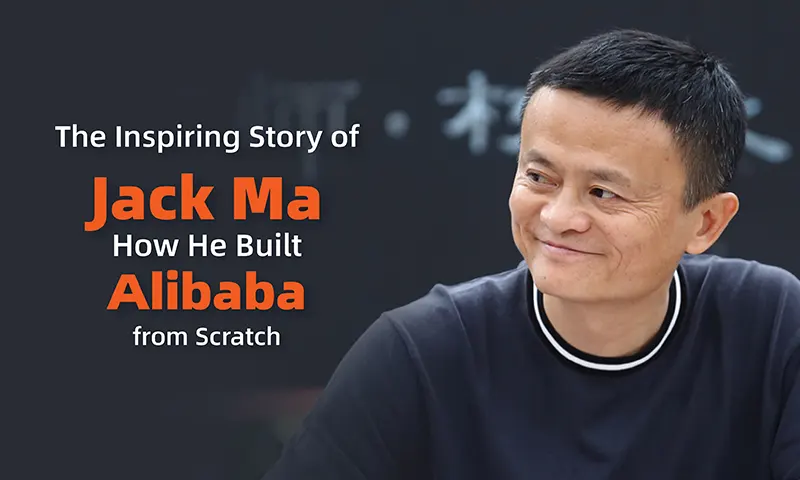Alibaba’s tenacious and charismatic founder, Jack Ma, has emerged as a global symbol of business success. His rise from a modest English teacher to the CEO of one of the biggest e-commerce businesses in the world is truly remarkable. This article will explore Jack Ma’s biography, challenges, and achievements, showing how he started Alibaba from the ground up, became a millionaire, and motivated millions of people worldwide.
Early Years and Lowly Origins
Born in Hangzhou, Zhejiang Province, China, on September 10, 1964, Jack Ma was formerly known as Ma Yun. Jack Ma had many difficulties as a child because he came from a low-income home. His family was barely supported by his parents’ meagre earnings as traditional musicians. In spite of the difficulties, Ma became very interested in studying English. He would ride his bike to a nearby hotel every morning and give visitors free tours in return for English lessons. In addition to improving his linguistic abilities, this experience expanded his worldview.
Struggles in Education
There were many setbacks during Jack Ma’s academic career. After two unsuccessful attempts, he eventually passed the Hangzhou Teacher’s Institute admission exam on his third try. Even after graduating, he applied for jobs and was repeatedly rejected. The police, KFC, and numerous other employers rejected him, as Ma famously described. He was unfazed by these disappointments and persisted in his unrelenting pursuit of his objectives.
Finding the Internet
Jack Ma initially travelled to the United States in 1995. The Internet was still in its infancy when he was introduced to it during this trip. Ma found the online world’s enormous potential to be fascinating. He saw how the Internet could revolutionise commerce, particularly in China. China Pages, an online directory for Chinese companies, was Ma’s first firm after he returned. Despite its failure, the initiative served as a foundation for his subsequent undertakings.
Alibaba’s origins
In 1999, Jack Ma gathered 17 of his friends in his flat and persuaded them to put money into Alibaba, his new business. The name’s broad appeal and phonetic simplicity led to its selection. Alibaba’s goal was to provide a platform that would allow Chinese SMEs to communicate with buyers around the world. With a $60,000 initial investment, the team began developing the website and marketing their online marketplace idea.
A $25 million investment from Goldman Sachs and SoftBank in 2000 was one of Alibaba’s significant turning points. Alibaba was able to improve its platform and grow its business thanks to this funding infusion. Ma’s abilities to motivate his staff and his unwavering pursuit of perfection were essential in getting through these challenging times.
Taobao’s Rise
Alibaba introduced the consumer-to-consumer (C2C) online marketplace Taobao in 2003 in an attempt to rival eBay, which had made its debut in the Chinese market. Thanks to its free listings, user-friendly layout, and cutting-edge features like instant messaging for both customers and sellers, Taobao quickly became well-known. A major factor in Taobao’s success was Ma’s in-depth knowledge of the Chinese market and dedication to client pleasure.
Innovation and Diversification
Alibaba kept expanding its product line and innovating across industries under Jack Ma’s direction. The business introduced Alipay, an online payment system that gave consumers a safe and practical means to make purchases, in 2004. Alibaba’s influence in the e-commerce sector was further cemented when Alipay swiftly rose to prominence as one of the most widely used payment methods in China.
With the 2009 introduction of Alibaba Cloud, Alibaba further entered the cloud computing space. The company’s entry into this new market showed that it was dedicated to remaining on the cutting edge of technology. Alibaba Cloud is currently among the top cloud service providers in the world, providing a variety of solutions to companies of all kinds.
IPO History: A Historic IPO
Alibaba created history in 2014 when it went public on the New York Stock Exchange (NYSE). The IPO was the biggest in history at the time, raising $25 billion. The company’s extraordinary expansion and the founder’s ambition were both reflected in this enormous accomplishment. An important factor in the success of this IPO was Jack Ma’s capacity to inspire investors and articulate his vision.
The Leadership Style of Jack Ma
Alibaba’s success can be attributed in large part to Jack Ma’s distinctive leadership style. Ma is renowned for his inspiring and captivating style, frequently engaging his audience with humour and storytelling. He encourages his staff to embrace problems and think creatively by highlighting the value of perseverance, creativity, and teamwork. A robust business culture that prioritises social responsibility, ongoing development, and customer happiness has been established under Ma’s direction.
Impact on Society and Philanthropy
In addition to his commercial accomplishments, Jack Ma is a devoted philanthropist. He founded the Jack Ma Foundation in 2014, with an emphasis on public health, education, business, and environmental preservation. The many projects and programs that his foundation supports demonstrate Ma’s dedication to giving back to society. He has vowed to contribute a sizeable amount of his fortune to philanthropic organisations, encouraging other prosperous businesspeople to follow suit.

